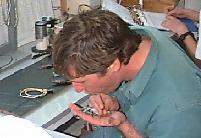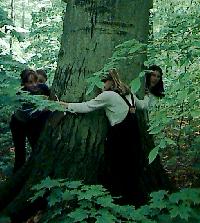
Today's News

Spring's Journey North

Report Your Sightings

Search Journey North
return to:

 A/CPB
A/CPB
Field Trip to Long Point Bird Observatory
Class 703 Dolphin Senior Public School
Streetsville, Ontario Canada
May 13, 1998
"I've never seen so many birds!" remarked Christine C.
 We arrived at the observatory just after 9:30 am after a 2 hour bus ride.
The weather was perfect! Sunny, light south wind, temperature +18C. It was the first clear night in 4 days.
We arrived at the observatory just after 9:30 am after a 2 hour bus ride.
The weather was perfect! Sunny, light south wind, temperature +18C. It was the first clear night in 4 days.
This suggested that a new wave of migrants would have made the trip across Lake Erie from the United States
the previous night. "I like the view of Lake Erie, all the way out to the lighthouse", observed Christine
T. As we drove out onto the base of the point, into the Long Point World Biosphere reserve, we could see the lighthouse
in the distance, almost 40 km away. This area is also a Canadian
Monarch Butterfly Migration Protected Area, as it funnels the butterflies heading to Mexico in the fall.
The variety of sounds of birds that greeted us as we exited the bus suggested our predictions about birds were
right! Mr. Murray, our teacher, went into the Banding Station where he met Jul Wojnowski, the Landbird Programs
Coordinator at Bird Studies Canada/Long Point Bird Observatory.
 Jul confirmed that it was already very busy in the station and out on
the capture nets and that students would have to be very sensitive to the work that was being done by the scientists
and to keep voices low. We split into 2 groups. Ten of us went out with Paul, another ornithologist and our parent
supervisors to collect birds trapped in the nets in the previous 15 minutes. "We got to see all these birds
hanging upside down!", recalled Tara M. "The nets are so thin they catch the birds so easily,"
Jul confirmed that it was already very busy in the station and out on
the capture nets and that students would have to be very sensitive to the work that was being done by the scientists
and to keep voices low. We split into 2 groups. Ten of us went out with Paul, another ornithologist and our parent
supervisors to collect birds trapped in the nets in the previous 15 minutes. "We got to see all these birds
hanging upside down!", recalled Tara M. "The nets are so thin they catch the birds so easily,"
said Jamie M.
 The others went inside to watch the banding of birds collected earlier
in the day. After an hour or so, we switched. Jul talked to us as he banded the many birds already gathered from
the nets. He measured and another
The others went inside to watch the banding of birds collected earlier
in the day. After an hour or so, we switched. Jul talked to us as he banded the many birds already gathered from
the nets. He measured and another
researcher recorded the data. Data collected included: Species, Sex, Wing length, fat level, band number. "It
was cool when he blew on the bird and we could see the bird's fat stores", said Garrett N. The birds that
stop at Long Point while migrating are trying to refuel by eating for a few days then continuing their journey.
The fat count, a 0,1,2 or 3 is a measure of how long the bird has stopped over. (The number fat increases at the
stopover point, as the birds gain weight.)
There were a lot of birders around that day and there were many more species of birds. We saw over 45 species of
birds either in the banding station or outside in the 1 hectare sight of the Old Cut Station. "It was interesting
seeing the birds up close", said Beth E. We saw them close up
both inside and outside!
 |
 |
|
Chestnut-side Warbler* |
Scarlet Tanager* |
- Birds banded while we were at the Banding Station
- Birds Caught in nets, Seen and /or Heard
(* = Neotropical Migrant)
Looking back over the list of birds we saw made Laura Q. say, "We got to see birds we've never seen before."
It was true. None of us had ever seen all of these birds before. Even the scientists had not seen some of them
for a while!
To find out more about:
- Bird Studies Canada or Long Point Bird Observatory
- The Long Point Area (including the Weather, Long Point World Biosphere Reserve and Backus Woods Carolinian Forest)
Backus Woods Heritage Conservation Area
 In the afternoon we visited Backus Woods Heritage Conservation Area which
includes the largest tract of undisturbed Carolinian Forest in Canada.
In the afternoon we visited Backus Woods Heritage Conservation Area which
includes the largest tract of undisturbed Carolinian Forest in Canada.
"It was a VERY long walk!" Christine T. reminded us. We got lost in the woods and ended up walking for
over 10 kilometres! But we saw birds, heard lots more and caught and released many species of frogs and salamanders
in the wet areas.
This is what remains of the "southern" forests that were once part of the landscape of Southern Ontario.
Most of these forests have now been largely cut down or disturbed. Unfortunately, these areas are also the homes
of the largest concentration of Endangered Species of plants and animals in Canada, including birds. A few of the
migrants we saw in the morning will nest here. An example is the Hooded Warbler which only nests along the north
shore of Lake Erie in Canada.
 We wish all Journey North classes could have joined us, but we hope that
since you couldn't, you'll learn from our report and pictures!
We wish all Journey North classes could have joined us, but we hope that
since you couldn't, you'll learn from our report and pictures!
Class 703
Dolphin Senior Public School
Streetsville, Ontario
Canada
(murray@cms.peel.edu.on.ca)



